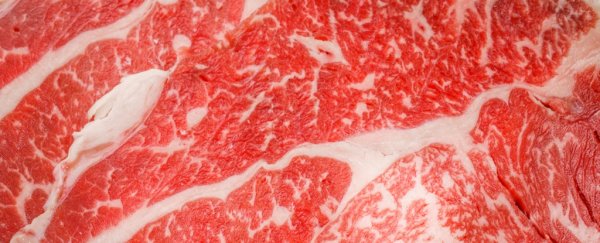If you've spent any amount of time on the internet recently, you might have come across a new fad diet doing the rounds: the all-meat 'pure carnivore diet'.
It's exactly what it sounds like. Advocates of this 'health regimen' consume meat and almost nothing else, save maybe a sprinkle of salt or other seasonings (and water). There's a strict ban on carbs, vegetables, and anything that wasn't once a living, breathing entity.
If you're thinking this sounds a little extreme, you're correct. And not just in terms of your health.
As numerous commentators are pointing out, this contemporary revival of interest in pure 'carnivorism' – a strange, simplistic adaptation of the Palaeo and keto diet trends – has been embraced by many on the political right.
In part, that's tied to the celebrity of who's recently been espousing the virtues of going 100 percent carnivore: controversial academic Jordan Peterson from the University of Toronto in Canada, who made waves online when he revealed his extreme diet in an interview in July.
"I eat beef and salt and water," Peterson told comedian and podcaster Joe Rogan. "That's it. And I never cheat. Ever. Not even a little bit."
Peterson picked up carnivorism from his daughter, Mikhaila, who champions carnivorism on her blog, Don't Eat That; but it's been promoted by many others online, most notably author and former orthopaedic surgeon Shawn Baker.
Baker, who had his medical licence revoked, now bills himself as a "Revolutionist", and is the creator of a Facebook group called World Carnivore Tribe, which acts as a hub for almost 20,000 unabashed meat-eaters.
The group's purpose is to "aggressively promote this lifestyle as a potent tool for promoting and restoring excellent health!" – a belief also held by the Petersons, Baker, and the countless other devotees of the contemporary carnivore trend, who all share different stories of how meat-eating has somehow 'healed' them (to paraphrase the #meatheals hashtag).
But has it, and does it?
When we see diet trends take off like this online, it's only natural to assume there's some plausible scientific basis for all these people's positive experiences – but scientists say there's no evidence to suggest a 100 percent meat diet is good for you. In fact, it's more likely to do you harm.
"Especially for somebody who's untrained and not very knowledgeable, I think it's dangerous for [Mikhaila Peterson] to be pushing this as a lifestyle," cardiologist Ethan Weiss from the University of California, San Francisco told BuzzFeed.
"People are very impressionable, especially people who are sick and they want to be better, and they'll try anything. I worry that this kind of thing is taking advantage of some people who are really struggling."
The problem is, if you don't get the right amount of vitamins, nutrients, and fibres from sources other than meat, you could risk developing health complications, including scurvy, which believe it or not, is making a scary comeback in the US right now.
"It's important to have a balanced diet that consists of different protein sources," a spokesperson for the Academy of Nutrition and Dietetics, Kristen Smith, told The New York Post.
"Fruits and vegetables provide micronutrients that our body needs for long-term sustainability."
In addition to what you're not getting on an all-meat diet, there's also the risk of getting too much of – you guessed it – meat.
Numerous studies have linked meat consumption to cancer, and while our understanding of the science is continually evolving, the consensus is the human body simply isn't suited to subsist solely on other animals.
"People who have elevated cholesterol, particularly LDL [bad] cholesterol, have an increased risk of coronary artery disease, and heart disease in general," says cardiologist Jennifer Haythe from New York-Presbyterian Hospital.
"We know that cholesterol leads to plaque development not only in your heart but in the arteries leading to your brain and in your legs. I don't think eating only red meat and water is sustainable."
So rather than be lured in by the latest fad that may ultimately endanger your health in all sorts of unknown ways, consider instead some less extreme healthy eating habits that are actually backed by science.
And by not going all-in on meat, you won't just be benefiting your own health: you'll be doing the environment a massive favour, too.
